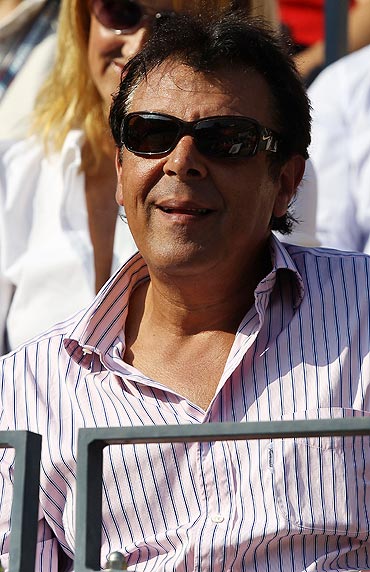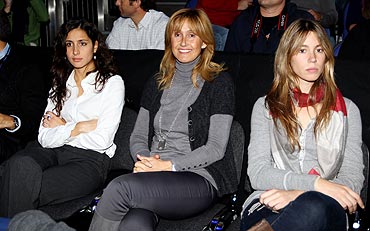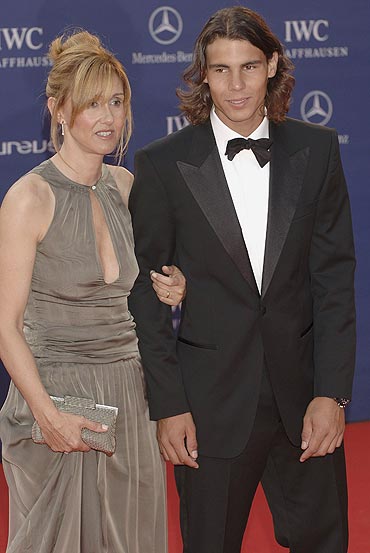 | « Back to article | Print this article |
'The news left me stunned'
In his recently-released autobiography, Rafa: My Story, Spanish tennis ace and World No 2, Rafael Nadal has claimed that the separation of his parents made him depressed and 'his competitiveness had waned'.
In an extract from the book, published in The Telegraph, Nadal says he was 'left stunned' when his father, Sebastian, broke the news to him that there were problems back home between himself and his mother, Ana Maria Parera.
Nadal was given the news on the flight from Melbourne to Dubai, just after he beat Roger Federer to claim the 2009 Australian Open.
"I quickly figured out he meant a separation was on the cards. The news left me stunned. I didn't talk to my father on the rest of the trip home."
"My parents were the pillar of my life and that pillar had crumbled. The continuity I so valued in my life had been cut in half, and the emotional order I depend on had been dealt a shocking blow. Our family was close and united, there had been no conflict visible, all we had ever seen was harmony and good cheer.
"Assimilating the news that my parents had been going through such a crisis after nearly 30 years of marriage was heartbreaking," Nadal wrote.
'Returning home now became uncomfortable and strange'
Nadal goes on to elaborate how the development affected his entire family, how his father's absence left a void.
"Suddenly, and utterly without warning, the happy family portrait had cracked. I suffered on behalf of my father, my mother and my sister, who were all having a terrible time.
"But everybody was affected: my uncles and aunt, my grandparents, my nephews and nieces. Our whole world was destabilised, and contact between members of the family became, for the first time that I had been aware of, awkward and unnatural; no one knew at first how to react."
"Returning home had always been a joy; now it became uncomfortable and strange.
"Through all these years of constant travel and ever more frenzied claims on my time as my fame had grown, Manacor and our neighbouring seaside resort of Porto Cristo was a bubble of peace and sanity, a private world where I could isolate myself from the celebrity madness and be entirely myself again.
"Fishing, golf, friends, the old routine of family lunches and dinners -- all that had changed. My father had moved out of our Porto Cristo home, and now, when we sat down to eat or watch TV, he wasn't there. Where there had been laughter and jokes, a heavy silence hung. Paradise had become paradise lost," he noted.
The emotional upheaval took a toll on Nadal's knees
Nadal reveals that depression had set in by the time of the French Open that year, and it took a severe toll on his fitness, his knee injury causing him to pull out of Wimbledon.
"Strangely, the effect on my game was not immediate. I was on a winning streak, and the positive momentum carried me through for a couple of months. I felt no elation at my victories, but my body somehow kept going through the motions.
"My attitude was bad. I was depressed, lacking in enthusiasm. My team members were at a loss as to how to react to the gloom that descended on me. They worried about me, and they worried about the impact of my parents' separation on my game.
"They knew I couldn't keep winning; they knew something had to give. And it did. First it was my knees that went. I felt the first twinges in Miami, at the end of March. The pain got worse week by week, but I managed to keep playing through it until early May, in Madrid.
"Maybe I should not have competed at the French Open, but I had won the championship the previous four years and I felt a duty to defend my crown, however unlikely the prospect of victory felt. Sure enough, I lost in the fourth round to Robin Soderling of Sweden, my first ever defeat in that tournament.
"This finally pushed me over the edge. I'd made a huge effort to be in shape for Roland Garros, battling to overcome both my parents' separation and the pain in my knees, but now I knew that, debilitated in mind and body, I could no longer keep going.
"Terribly sad, I pulled out of Wimbledon. My knees were the immediate reason, but I knew that the root cause was my state of mind. My competitive zeal had waned, the adrenalin had dried up," he wrote.
'Cause-and-effect connection between emotional distress and physical collapse'
Nadal says it was only when his physical trainer, Joan Forcades, provided an insight did he realise the link between his physical and mental breakdown.
"My physical trainer, Joan Forcades, says there is a 'holistic' cause-and-effect connection between emotional distress and physical collapse. He says that if your head is in permanent stress, you sleep little and your mind is distracted -- exactly the symptoms I was showing at that time -- the impact on your body is devastating. Messages are relayed to the muscles that, under the pressure of competition, lead to injuries. I am sure Joan is right," he wrote.
"Being at Wimbledon, trying to get fit, instead of at home reminded me every minute of how dramatically our lives had been altered, which only deepened my introspection and grief. I've never reached the point of hating tennis, as some professional players say they have. You can't hate something, I don't think, that puts the food on the table and has given you almost everything you have in life.
"There can come a time, though, when you grow weary and a part of that fanatical enthusiasm you need to keep competing at the highest level begins to ebb. I've always believed, as my coach and uncle Toni has, that to keep competing you must never break your established patterns," he elaborated.
"You have to carry on training hard, long hours whether you feel like it or not, because any slack in intensity will be reflected in your results on court. But a point comes when you just cannot keep going at 100 percent, mind and body, every single day, and the best thing to do is pause and wait for the desire to return."



